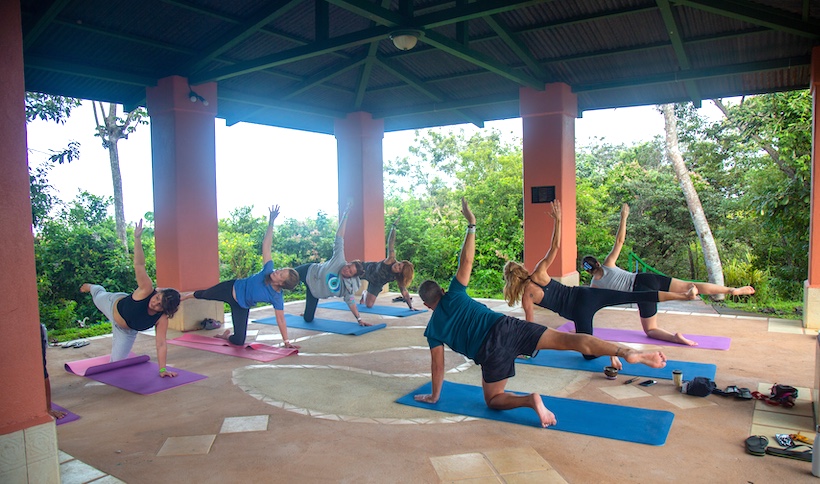
An outdoor yoga class at Hacienda Guachipelin near the volcano Rincon de la Vieja in Costa Rica. Therapist/yoga teacher Ashley Shires directs a Choose Life’s morning sessions. Photo by Paul Bikis
From Dry January to Dry July and Sober October, an alcohol-free movement is slowly taking over the calendar year—and nibbling at the beverage market share. This increased emphasis on nondrinking is rippling into the sorts of drinks bartenders are pouring, wellness activities offered at hotels, and the economics of travel. One recent study commissioned by Expedia found that half of respondents were interested in staying at hotels that offered easily accessible alcohol-free options like mocktails and nonalcoholic beer.
Who are these nondrinkers?
Who are all these travelers who turn down wine in Italy, sake in Japan, cerveza in Mexico and ouzo in Greece? According to Expedia’s research, staying in control was the main reason for the one out of every four travelers who aimed to decrease alcohol use on vacation.
An estimated 12 million Americans have quit drinking because of addiction problems, and people who abstain for religious, health or other personal reasons. There’s also a rising category of “gray area drinkers,” who fall somewhere between moderate and risky drinkers and have decided they’re better off going teetotal. The wellness movement has also increased the number of non-drinkers. Alcohol use has been linked to anxiety, sleep disturbances, dehydration, puffy eyes and a dull complexion.
Booze-free Group Travel
Some people are confused by why a sober travel movement is necessary. Comments in online forums include things like, “Have people become so weak that they can’t say no to alcohol if they want to? Don’t want to drink? Don’t.” Another one: “I don’t understand why anyone would feel uncomfortable if they don’t want to drink alcohol.”
Sure, it sounds simple. Just say no. But constant exposure to alcohol can be stressful for people in recovery. It can be unpleasant when a companion’s drink is an arm’s length away. And for people who don’t drink for other reasons, few things are more boring than having to sit for hours with people sniffing, swirling, sipping and endlessly yakking on about wine.
Thus the rise of alcohol-free travel groups. While still a minor trend, some small companies are exclusively offering sober group trips, and bigger companies are featuring occasional alcohol-free itineraries.
Isabel van Zuilen leads relaxing, outdoorsy retreats for sober and sober-curious women under the name Sobertopia. Her June retreat in Spain is fully booked, but she’s just announced her first California retreat this September. “I think it’s absolutely great that the sober lifestyle movement is growing faster than ever, and I love being a part of it,” she said.
Should Boozers Be Banned?
Choose Life Sober Adventures offers trips to Costa Rica, Peru and Kenya. “We’re only in our second year of operating and we are running most of our trips this year at almost capacity,” said founder Cole Bressler. “Which is pretty unheard of for a travel company.” Bressler sells travel on the community aspect. “We go to places that are relatively accessible by yourself. If you just wanted to go to Machu Picchu or Costa Rica, you could do that. The reason people choose us is because they want to have this experience with a group of their fellows, a group of people that have a similar life experience.” To foster this connection, Choose Life itineraries feature mindful components like yoga and meditation and an optional nightly recovery meeting.
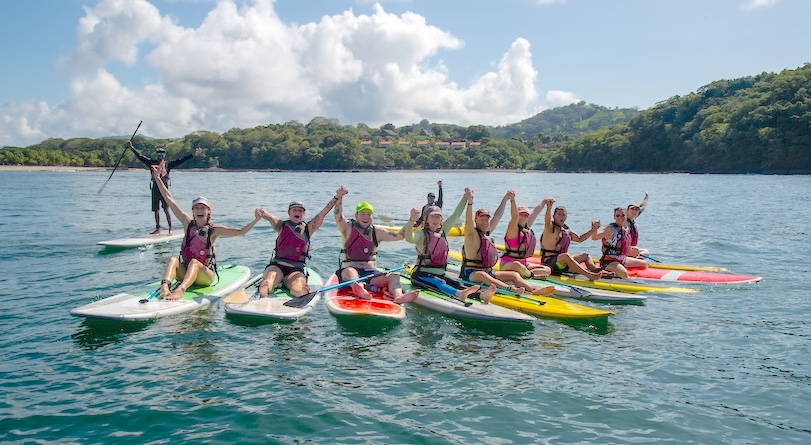
Part of the Choose Life philosophy is to get people in recovery to try new things in a supportive community. Here participants take a break from standing up on their paddleboards in the Pacific Ocean in Guanacaste Province, Costa Rica. Photo by Paul Bikis
Sober Vacations International, the granddaddy of sober travel, centers around a 12-step recovery model, offering AA meetings on all of its trips. Since its founding in 1987, SVI has bought out entire resorts and turned them into “sober villages” for a week, as well as taking large groups on cruises and tours around the world.
Darci Murray, founder of Hooked! Alcohol-Free Travel, offers action-packed itineraries in far-flung places like Tanzania, Vegas, Morocco and Sayulita, Mexico. “HOOKED has eight trips on the roster for 2024,” Murray told me. “We are off to Greece in June and are very excited to see what Virgin Voyages has in store for us.” Virgin has positioned itself as the cruise line with the most mocktails at sea. “We have a block of 125 rooms on a cruise in 2025 to Alaska and have already sold a quarter of the group blocked space.”
Murray moved her messaging away from “sober” because it sounded too much like a recovery retreat. Instead of retreating, she wants to lead participants on alcohol-free, full sensory charges into the world. That could mean motoring in a monster truck in Nashville or smelling spices in a Marrakesh market. In Iceland, HOOKED participants experienced cold water plunging, a Viking ice massage, and a group scream. “We went to Gullfoss Falls and we did a stress-release scream,” Murray said. “We screamed at the top of lungs. It was so fun.”
Dry bars
Both alcohol-free bars and alcohol-free drinks in regular bars have proliferated in the last few years. Bar owner and long-time NYC club personality Abby Ehmann opened her East Village bar Lucky in 2016. Her vision was to create a vibrant community. But she was too successful. “It was so good that people were coming every day and enjoying what I was creating, and then they were drinking every day,” she said. “I was minting fresh new alcoholics.” When her two best customers stopped drinking—one after a stroke, the other from pandemic overindulgence—Ehmann opened her sober bar Hekate Café & Elixir Bar right across the street from Lucky. She wanted to provide a happy community gathering place without alcohol. The witch-themed Hekate looks like a bar but features a huge menu of zero-proof cocktails, elixirs and teas.
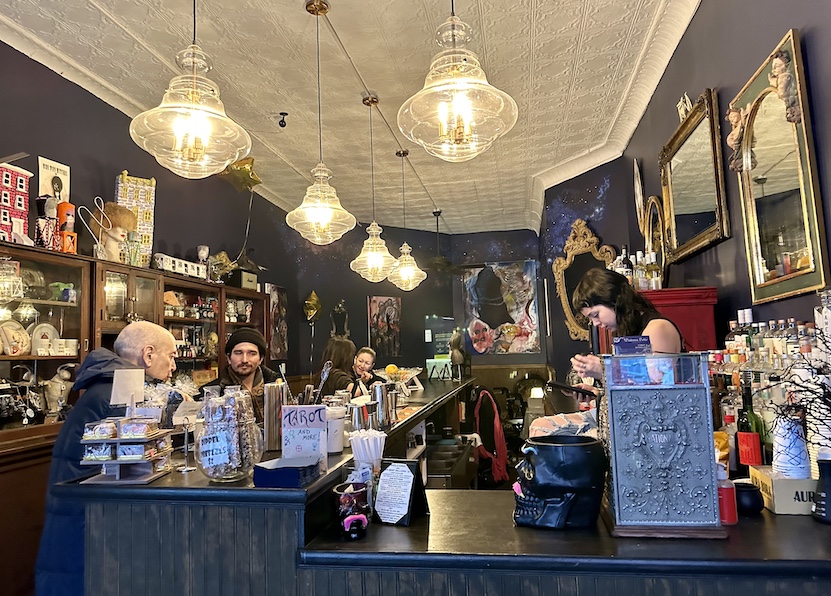
Hekate Café & Elixir Bar, New York City’s first dry bar, offers an alcohol-free gathering place in the East Village. Photo by Teresa Bergen
“There are a million bars in New York, but we’re the only sober one,” said Ehmann. She’s excited when she sees people pull up in a cab. “People make it a destination, make it a plan, which is so exciting to me. That people enjoy what I’m doing is very gratifying.”
People new to modern mocktails might expect them to taste syrupy sweet, like a Shirley Temple. But nowadays there’s a whole array of non-alcoholic botanical spirits to craft drinks with interesting flavors—some sweet, some not. Andy McMillan, founder of Portland’s pop-up bar Suckerpunch and Heck Non-alcoholic craft brewery, has thought a lot about what makes a good zero-proof cocktail. “The idea of opening a zero-proof bar only to serve non-alcoholic knockoffs of classic craft cocktails just seems like a completely wasted opportunity,” he said. “There are so many other ways to create complex non-alcoholic cocktails that don’t try to mimic liquor in the drink or use spirit parities.” McMillan favors ingredients like smoked salt, tarragon, Lapsang tea and dill oil, rather than sugary fruit juices. “That’s another really obvious place that people go with non-alcoholic drinks. If you want a juice, go to a juice bar,” he said.
Wonders of Water
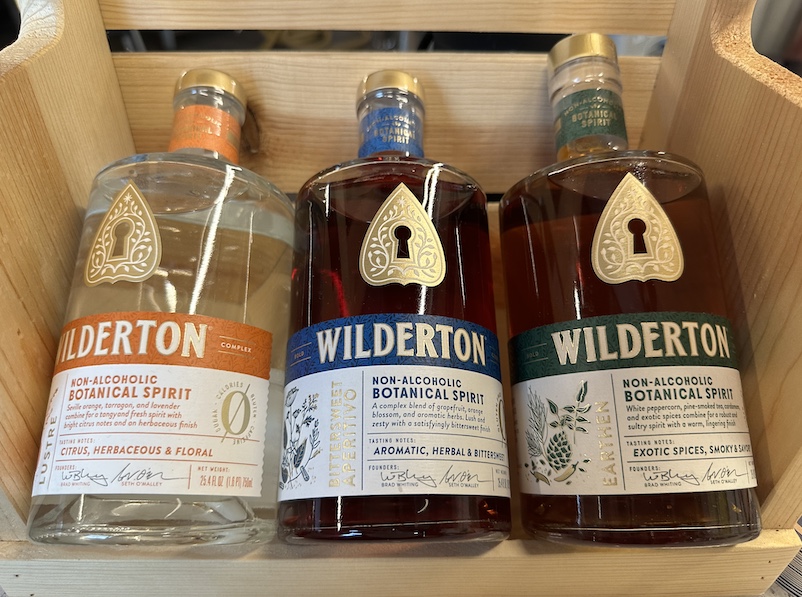
Chief distiller Seth O’Malley draws from his large botanical collection to devise innovative non-alcoholic spirits for Wilderton Botanical Spirits. He strives to create original spirits, rather than alcohol replicants. Photo by Teresa Bergen
Last year in Hood River, Oregon, Wilderton Botanical Spirits opened the country’s first non-alcoholic distillery and tasting room. Co-owners Brad Whiting and Seth O’Malley started working on their new company in Portland in 2019. Whiting is a liquor industry veteran, while O’Malley has an extensive background working with tea. “I had a lot of knowledge and affinity for the kind of botanicals that come through in a tea context,” he said. That is, using water rather than alcohol to extract. So far, they’ve developed three non-alc spirits. Lustre is a clear drink. “It’s got flavors that we associate with brightness like citrus, flavors that we associate with warm weather and sunny seasons, like roses,” O’Malley said. Earthen is darker and more intense, with baking spice and unusual incense notes. Bittersweet Aperitivo blends grapefruit with orange blossom and aromatic herbs.
Since moving to Hood River last year and opening the tasting room, a wide range of guests have visited. Gen Zers, millennials, pregnant women and new parents are all enjoying Wilderton drinks as part of a healthy lifestyle, whether they’re teetotalers or not.
Alcohol-free in regular bars
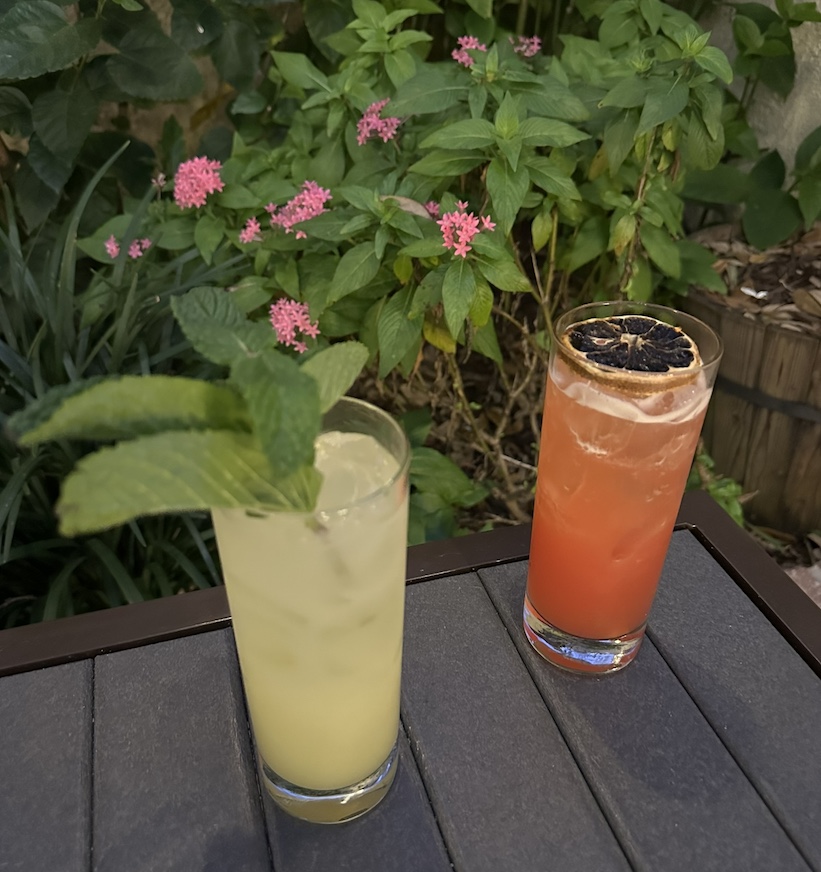
Catch 27 in St. Augustine, Florida offers several special alcohol-free drinks, including a ginger soda made with freshly juiced ginger and the All Bark mocktail, which contains preserved lemon, grapefruit, Giffard aperitif, and orgeat. Photo by Teresa Bergen
But you don’t necessarily have to go to a special bar to get an interesting non-alcoholic drink. More and more regular establishments are promoting zero-proof drinks. At Burlington, Vermont’s Juniper Bar & Restaurant guests can try the new temperance Irish coffee or a non-alc zesty raspberry sour. St. Augustine, Florida introduced a new Mocktail Trail. Standouts include the All Bark–preserved lemon, grapefruit and Giffard aperitif—which customers can sip in the beautiful garden of Catch 27 in downtown St. Augustine. Obviously, the nondrinking public is demanding more than sparkling water.
Hotel groups are getting in on the action. Tempo by Hilton has introduced a “Free-Spirited” menu featuring non-alc takes on classic cocktails. The Hyatt Hotel Group’s “Zero Proof, Zero Judgment” program offers a sophisticated alcohol-free menu at many of its properties. The Wynn Las Vegas has adopted wellness ingredients like reishi mushroom and ashwagandha for its sober menu. Both Celebrity Cruises and Virgin Voyages are amping up their mocktail game.
Sober in the air
The alcohol-free trend has wings. “We’re hearing more frequently from our guests that they are looking for premium nonalcoholic beverages. Nonalcoholic beer is a growing category and an option we’ve offered in our lounges for a while now,” a spokesperson for Alaska Airlines told The Points Guy. Alaska started serving nonalcoholic beer by Best Day Brewing on board during Dry January of 2024.
JetBlue stocks Athletic Upside Dawn Golden Ale, another non-alcoholic beer, and offers a mint, ginger, lime and cucumber mocktail in business class. Several of the Middle Eastern airlines are either dry or BYOB.
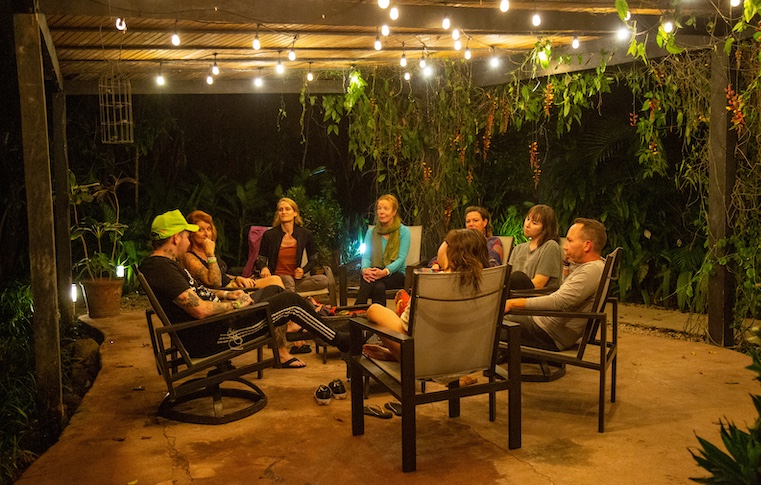
On a Choose Life adventure, every evening ends with an optional recovery meeting on a theme like gratitude or setting boundaries. Here the group meets poolside at Hacienda Guachipelin in Costa Rica. Photo by Paul Bikis
A growing trend?
Will more people decide to ditch alcohol? Or is this the height of the alcohol-free movement, and will some current teetotalers return to drinking? It could go either way. But there will always be a significant number of nondrinkers, whether due to recovery, religion, health or personal choice. And now that nondrinkers are getting more used to the wider availability of interesting nonalcoholic drinks and sobriety has become more mainstream, they won’t have to nurse soda water and resent being somebody else’s designated driver.
Steve Abrams, founder of Sober Vacations International, has led more than 100 trips around the world—all of them without a drink. During a 2022 sober village trip, he came home with 400 people already signed up for the following year. “We’ve had over 20 people meet and marry on trips,” he said. “These are people who love sobriety and love a bigger life and want to have fun without getting loaded.”
Teresa Bergen writes about outdoors, cultural and sober travel. She is the author of Easy Portland Outdoors and Sober Travel Handbook, and co-author of Historic Cemeteries of Portland, Oregon.

